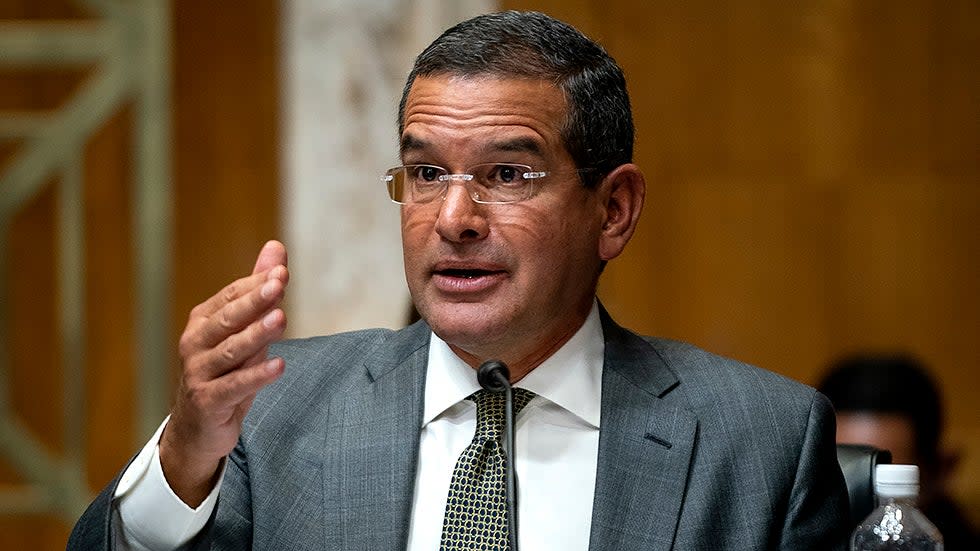Pierluisi: Puerto Rico no longer facing 'any significant fiscal challenges'

- Oops!Something went wrong.Please try again later.
- Oops!Something went wrong.Please try again later.
Puerto Rico's Democratic Gov. Pedro Pierluisi said Wednesday that the island's years of fiscal turmoil are in the past, with public finances buoyed by economic recovery, a debt restructuring deal and a significant influx of federal funds.
"No question that we will not be facing any significant fiscal challenges in the future," Pierluisi told The Hill on Wednesday.
Puerto Rico's economy has seemingly taken a positive turn over the past year after a nearly quarter-century decline that saw the island lose half a million inhabitants to emigration from 2004 to 2020.
The U.S. territory's economy seemed to hit rock bottom in 2016, when it entered a bankruptcy-like process and Congress passed the Puerto Rico Oversight, Management, and Economic Stability Act (Promesa), imposing a fiscal control board to oversee the island's finances.
But the following year two major hurricanes hit the island, accentuating Puerto Rico's economic woes and highlighting the fragile state of its infrastructure.
Political wrangling with the Trump administration and a political scandal that toppled former Gov. Ricardo Rosselló (D) slowed the flow of federal funds for reconstruction and kept the territory's economy on pause.
Puerto Ricans in 2020 showed their discontent with politics as usual, granting electoral clout to five local parties - rather than the traditional three - with a plurality voting in Pierluisi.
"There has been fragmentation in terms of the party system in Puerto Rico," said Pierlusi, adding that means candidates will likely win pluralities, rather than outright majorities, in future elections.
"That will continue to be the case in the near future," he added.
But Pierluisi, who lost the 2016 New Progressive Party (PNP) primary to Rosselló, is seen as an even-keeled politician and conciliator, something he says is necessary to right the ship.
Economically, Pierluisi is being dealt a better hand than his predecessors, with plenty of money coming in and a drastic cut in debt payments.
Last month, a federal judge accepted an agreement negotiated with Puerto Rico's main bondholders that will save the island's government an estimated $50 billion in debt payments, reducing debt service from 27 cents per dollar to 7.8 cents per dollar.
That deal also stabilized Puerto Rico's pension plans, meaning Pierluisi will not have to cut the popular measures, even as he amps up spending on public services and construction.
"This debt restructuring Plan of Adjustment that the court just affirmed, definitely sustainable and affordable and allows the government of Puerto Rico to provide the essential services as it must ... and to do away or leave behind the austerity we went through the last seven years," said Pierluisi.
And two factors are propelling the island's revenue: federal funds for reconstruction, pandemic relief and infrastructure spending, and a growing economy that's inflating tax revenue.
According to Pierlusi, the territorial government's revenue is currently exceeding estimates by about $1 billion a year.
"What's happening as we speak, is that our local Treasury Department is collecting revenues well in excess of the fiscal forecast," he said.
Federal money is flowing as grants managed by the Department of Housing and Urban Development (HUD) for hurricane reconstruction, and through various channels created in the American Rescue Plan as well as the Bipartisan Infrastructure Framework.
The relief funds in particular have been technically available for years, but differences between San Juan and Washington kept the appropriated funds from flowing at the speed needed for recovery.
"Ever since [HUD] Secretary [Marcia] Fudge assumed office, quite a number of bureaucratic restrictions were lifted," said Pierluisi.
The bullish governor sees this boon as an opportunity to rebuild the territory's infrastructure, while modernizing it to meet federal regulations, particularly in terms of the environment.
"The public energy policy law requires us to turn to renewables on a very aggressive or proactive basis. By 2025 ... 40 percent of our power generation must come from renewable sources," said Pierluisi.
Currently, about 3 percent of Puerto Rico's energy production comes from renewable sources.
"So, easier said than done - I am really committed to doing this," he added.
In meetings with Biden administration officials Wednesday, Pierlusi agreed with officials from the Departments of Energy, Homeland Security and Housing and Urban Development to use $12 billion in federal funds to achieve that goal.
While various sources of federal funding have aligned for Puerto Rico in 2022, in the past the well has often dried up as Washington turns its attention elsewhere.
Pierluisi said that, pending final numbers, the population of Puerto Rico remained stable for the first time since 2004, in part because of the good economic news brought on by congressional action.
"It makes no sense to mistreat residents of the territories, because you're simply encouraging them to hop on a plane and go to the states. We're not immigrants," said Pierluisi.

